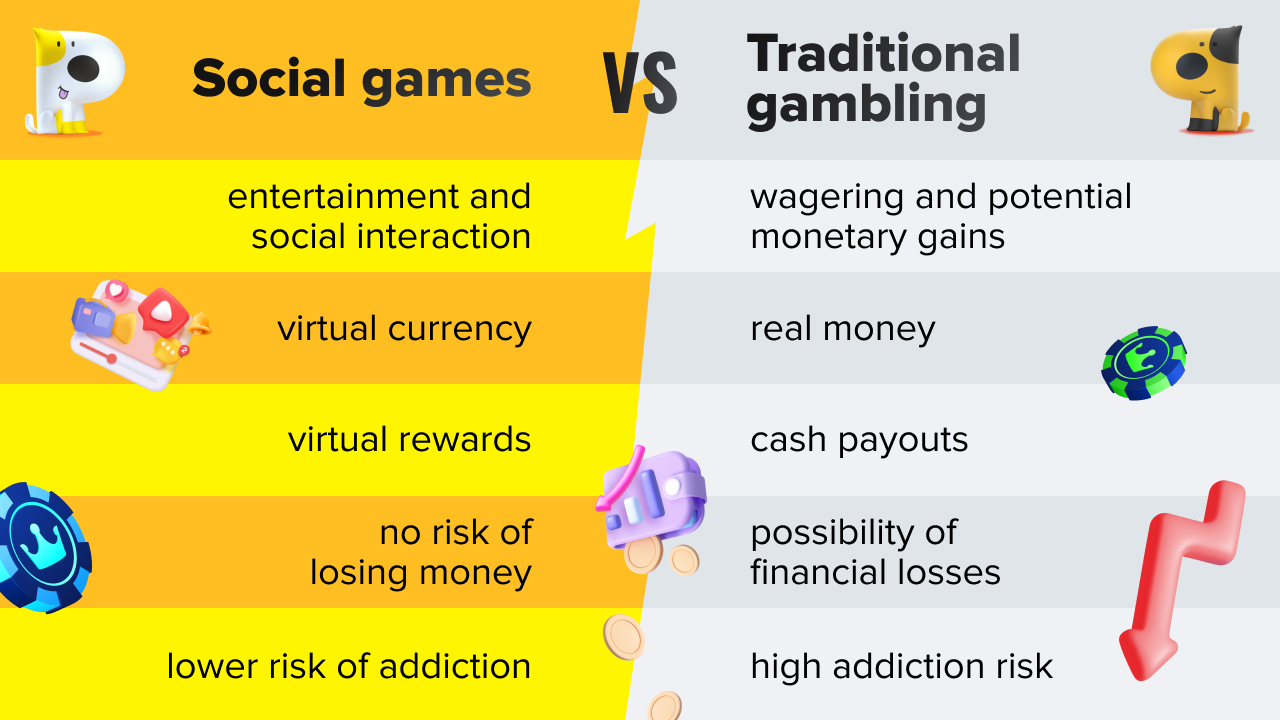Betting Chips or Betting Clicks: Social Games vs. Gambling

Human society is built on social interactions, and games are one of the oldest forms of these. They have always been a core part of every culture, and with the rise of the digital world, their role has become even more visible. . And since hazard and excitement have always been part of human nature – people have always tried to beat the odds and win big.
Just a few decades ago, you could still find people who discarded digital games in favor of real-world entertainment. Now, it is difficult to find a person who doesn’t have at least one game installed on their electronic device. Ultimately, it is this trend that has led to the emergence and boom in popularity of two genres: social games and digital gambling.
They seem similar to each other on the surface: both mediums offer the same games, both feel rewarding when you have a major win, and both provide endless entertainment value. Yet, social games and gambling are vastly different. They operate on contrasting motivations, have players achieving very different results and attract their own types of participants.
In the interconnected world of digital entertainment, it is crucial to distinguish one from another and determine how to responsibly manage the engagement you have when gambling, regardless of whether you are using virtual or real tokens. . Today, let’s dive into the unique domains of social gaming and gambling and learn more about these two related yet very different groups.
Let’s Talk Facts: Social And Gambling
Social gaming in itself can be anything—card and board games, “Connect 4,” social media time-killers, or MMORPGs. The important aspect here is not the type or platform, but the ability to communicate and interact with other players. If this feature becomes the main point of the game, it can be called “social”. As a consequence, people do not play it to achieve victory or gain some kind of material value – they do it to connect with people.
In that regard, social gaming, especially communal casinos may seem suspicious at first; after all, they have all the same slots, blackjacks, and roulettes as real casinos. Yet they use only virtual currency that cannot be converted into real money. Yes, social casinos still enable players to play and wager, but without monetary reward. That aspect gets put aside in favor of a far more important one: socialization.
This is something that online casinos usually lack. You enter the app, roll the slots, or even enjoy blackjack with real people—but without text and video chat, common goals, and teamplay incentives, the focus is only on your financial gain.
However, putting these differences aside, both social casinos and iGaming are immensely popular. What is more, their fame boosts each other; the gameplay similarities constantly attract people from online casinos to social ones, and less often vice versa.
Online casinos are one of the most popular formats of entertainment on the app market. In 2022, the customer spend for online casinos reached $8.3 billion dollars, and the social casino spend has so far amounted to $7.3 billion dollars in 2023. Both niches are steadily growing in size, and by 2028, the online gambling industry is anticipated to grow by 86%.
This will happen if regulatory changes do not get in the way. And this is the biggest advantage working in favor of social casinos. Online gambling needs to follow a strict set of procedures and rules, which is only increasing each year. Social gaming, on the other hand, is relatively harmless and not under the constant supervision of the authorities.
Delving into the Advantages of Social Games: Creativity and Connections
Social games are all about fostering your inner creative spirit and working together with others to build something new. It can be anything—solving word puzzles together, devising a sound plan in strategy games with other players, or just helping each other out in farming games.
Let’s take a title that has already redefined the social gaming niche for years to come: Minecraft. It gets rid of all the negative emotions spent competing with other users; instead, it encourages players to come together, cooperate, and socialize to build their own world. Its very nature is what has made it accessible to huge audiences, resulting in it being the best-selling video game in the world.
Social gaming is akin to this. Without risking players’ money and putting them under the pressure of constant competition, they are loved by audiences all over the world. Furthermore, they encourage collective problem-solving via in-game events that require players to work together in order to advance the story or achieve a common goal. With nothing to foster negative emotions, social casinos embody the example of a laid-back game with nothing but positive encouragement.
The Close-Knit Community
Crazino, a social casino game, has a very large friendly community with a constant influx of new faces. It has achieved this by reinforcing the very same principles mentioned above: cooperation, positive reinforcement, and socialization. Without these, even the most in-depth game remains just a way to spend time. The Crazino team knew that, and the introduction of those principles made the game into something bigger — almost a social network of its own.
Crazino itself is seemingly simple, with players coming in to enjoy their favorite casino games risk-free. However, it quickly enthralls them with the world built outside of the gaming experience itself. The global plot advanced by character-driven interactions and player cooperation keeps the game fresh, and the live events and challenges encourage steady immersion. With its own system of achievements and chat features, Crazino is all about positive human interactions and sharing, which, in turn, compel players to keep coming back.
Crazino shows the importance of a close and welcoming community in online games. People may play single-player games to relax, but they get online to make new connections and reinforce old ones. Do it correctly, and the social game will turn from a fun activity to a virtual home.
Social and Gambling: The In-Depth Comparison
We have already discussed that these two niches are different in their very principles. Still, it would be best to compare them by their core aspects that make up the very foundation of each genre.
First of all, currency. Social games – including social casinos, do not use real money in any shape or form. The only way to invest that money in the game is to acquire the in-game currency; that, though, can be completely bypassed. These casinos regularly reward players with their currency in more ways than one. You can get virtual coins through daily log-ins, events, occasional loyalty rewards, and, of course, through in-game slots and casino games.
Casinos, on the other hand, use real money. While there are usually several ways to get additional funds from casinos through bonuses and promotions, in the end, players will have to spend their own budget to enjoy the game. There is no way around it, since even the most generous bonuses are acquired through real money deposits; otherwise, players would get to play for free.
This leads us to the second difference: the possibility of money loss. The only way to spend money in social casinos is to get their currency; in online casinos, the whole system is built on spending money. It is always a game of risk, in which, to continue playing, the only way is to spend more of your cash.
That, however, connects to the third difference. The only rewards players get in social games are virtual; you cannot redeem those for their real equivalents or exchange them for real-world prizes. Online casinos, on the other hand, promise their players cash payouts. This certainly can be alluring, but ultimately leads to the fourth variation.
Another important factor is the real chance of becoming addicted. Players can get hooked on the possibility of a win and, therefore, an opportunity to become rich. They can spend unrealistic sums of money just for this longshot, with nothing guaranteeing it. This cycle can continue with the sum of money wagered gradually rising. According to statistics, 80% of U.S. citizens gamble at least once a year, and 5% of them admit to becoming gambling addicts.
Social casinos do not have that issue due to the lack of any monetary gains. Additionally, players do not need to invest money to continue playing; they get access to enough currency to play even daily. Naturally, there are still cases of people getting too invested in social casino games and making frequent in-game purchases, but these incidents are few and far between.
To sum it up, these two niches stand on two distant principles. Social games are built to reward human interaction and entertain, first and foremost. In turn, online casinos primarily exist for players to wager real money and have the chance to increase their winnings many times over.
Acknowledging Internal Problems: Walking The Knife Edge
In recent years, the line between social and real casinos has become increasingly blurred. While the former is still disproportionately far from the latter, it is important to understand these developments. There are many reasons for these, but we can highlight the most important ones:
- Micro-transactions. Just acquiring the currency to continue playing right here and now is one thing. However, certain social casinos have picked up “loot box” mechanics from other genres. These provide players with random rewards and are strikingly similar to how real gambling operates. Customers have a chance to get rare and unique items that would otherwise cost extra in the in-game shops. While these are often cosmetic items, the gambling feeling of gambling is certainly there, and it becomes easy to get hooked.
- Regulatory evaders. Real casinos are held under the strict control of gambling and public authorities and must adhere to numerous standards to stay in business. Some of them have decided to change the scenery and enter the social casino gaming industry. These games are often far more predatory with their currencies, in-game purchases, and mechanics, and may force players to spend money more often.
Regulators are slowly catching up to these practices, but for now, it is up to customers to make informed decisions about the games they are playing. A good game will undoubtedly have responsible gaming practices. These may include setting monthly limits, willfully suspending your account for a certain amount of time, or even disabling in-game purchases entirely.
Naturally, it falls on developers and platforms to recognize this issue and put certain standards in place. These may include the requirement to have transparent gambling mechanics and anti-exploitation measures.
A Plea For Responsible Entertainment
Ultimately, any kind of gambling carries an inherent risk of addiction, even if no real-world money is used. This is long proven by the large spend numbers of games with loot boxes and predatory freemium titles. Still, it does not have to be that way, and social games developed by transparent and fair developers keep the risk of addiction to a minimum.
Even when developing a social game with your usual share of casino entertainment, it is important to remember what social games are about. They do not have to be full of randomized cosmetic rewards or be stingy with their virtual currency; instead, they ought to foster creativity, bonds between people, and a sense of community before anything else. If the game adheres to these standards, the relationship between the developer and its audience becomes mutually beneficial.
There is a fine line between the entertainment of social games and the financial risks carried by online casinos. Some social casinos may walk that line, but the good ones will recognize their existence and never come close.
Because, above all, social gaming is about fun and connection. As long as no user is having fun at the expense of another, there should be nothing to be concerned about.






